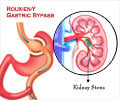A research team, led by an Indian-origin scientist, has linked gastric bypass surgery to an increased risk of kidney stones.
Gastric bypass surgery may lead to an increased risk of kidney stones, a research team led by an Indian origin scientist has revealed.
The study found that morbidly obese patients who undergo a particular type of gastric bypass surgery called Roux-en-Y gastric bypass (RYGB) are at a greater risk of developing kidney stones, small, pebble-like deposits that can result in severe pain and require an operation to remove them, earlier than previously thought.These stones develop in patients within only a few months following the procedure rather than several months to years, according to the research.
"Our data suggests that RYGB is associated with an increased risk of forming kidney stones as early as three months post-operation," said study's lead investigator, Manoj Monga, MD, FACS, Professor of Urologic Surgery, University of Minnesota, Minneapolis.
"We hope our findings and subsequent research will eventually allow clinicians to more accurately counsel patients on their individual risk of kidney stones and develop strategies for the prevention of this sometimes painful condition, such as dietary modification and medical therapy."
RYGB is the most commonly performed surgical intervention for morbid obesity. During the procedure, a small pouch is created by stapling part of the stomach together or by banding the stomach, limiting the amount of food a patient can eat. Next, a Y-shaped section of the small intestine is attached to the pouch to allow food to bypass the first part of the intestines.
This process causes reduced calorie and nutrient absorption. Although RYGB is a safe and effective treatment for morbid obesity, nephrolithiasis (the formation of kidney stones) has recently raised concerns among patients undergoing RYGB.
Advertisement
Surgeons conducted a prospective, longitudinal study of 24 morbidly obese adults (9 men and 15 women) from a university-based bariatric surgery clinic scheduled to undergo RYGB between December 2005 and April 2007. Five patients had a history of nephrolithiasis.
Advertisement
Both of these factors have been demonstrated by earlier studies to be major risk factors for the development of kidney stones.
Significant increases were noted in urinary oxalate excretion and relative supersaturation of calcium oxalate at only three months post-RYGB. Six patients (25%) developed de novo hyperoxaluria. There were no preoperative patient characteristics predictive of increased risk of kidney stone formation.
The study is published in the June issue of the Journal of the American College of Surgeons.
Source-ANI
RAS/L











